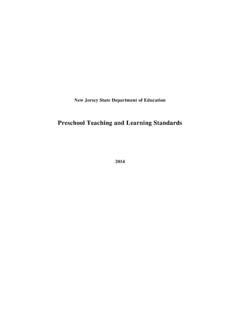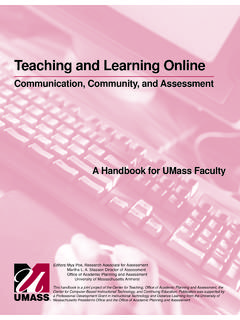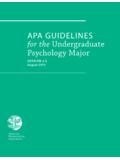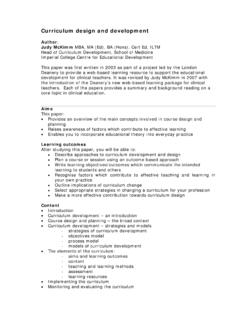Transcription of Teacher Leadership: Leading the Way to Effective Teaching ...
1 1 Teacher leadership : Leading the Way to Effective Teaching and learning Barnett Berry, Alesha Daughtrey, and Alan Wieder January 2010 A rich literature both within education circles and in other kinds of labor markets links teachers sense of efficacy and collective responsibility to their Teaching effectiveness and improved student Prior research has found that a Teacher s self-efficacy as an instructional leader is strongly and positively associated with soliciting parent involvement, communicating positive expectations for student learning , improving instructional practice, and being willing (and able) to innovate successfully in the Increased opportunities to lead build on one another and translate into increased success for instructional leaders.
2 Teachers who report more control over the policies in their schools and greater degrees of autonomy in their jobs are more likely to remain in Teaching and to feel invested in their careers and However, teachers have few opportunities to lead and influence both policy and programs. In fact, Teaching is a traditionally flat profession, with few opportunities for teachers to advance professionally without leaving the If teachers are to be promoted within education, such as moving into administration, then they no longer work with students directly. And once they no longer work with students they often lose not only classroom perspective but also credibility with their colleagues as instructional leaders.
3 In this policy brief, Teachers Network and the Center for Teaching Quality (CTQ) consider the ways in which Teacher leadership is key to present-day Teaching effectiveness and a healthy future for the Teaching profession. We draw on surveys and interviews of teachers in urban, high-needs schools as well as a broader research literature to demonstrate that when teachers are empowered as instructional leaders and decision-makers, students and the public schools they attend will benefit. Unpacking the Evidence on Teacher leadership and Effectiveness About the Teachers Network Study With the support of the Ford Foundation, the Teachers Network undertook a national survey of 1,210 Teacher leaders, to better understand the role that participation in Teacher leadership networks plays in supporting and retaining Effective teachers in high-needs urban schools.
4 Follow-up interviews with 29 network participants provided a more nuanced view of ways in which opportunities for collaboration and leadership (within and beyond the classroom) can increase Teacher efficacy and effectiveness, and improve the retention of the classroom experts students deserve. The survey sample was drawn from a diverse and accomplished group of preK-12 Teacher leaders in every subject area: 93 percent were fully state-certified in their subject area and grade level at the time of the survey and 78 percent held at least a master s 2 degree. A majority reported that they worked in urban, high-needs schools, where more than 75 percent of the student body was comprised of low-income or minority students.
5 The Teachers Network data have some significant limitations, both related to the instruments used and the fact that subgroups of teachers surveyed were too small to permit meaningful disaggregated analysis.* However, it is a unique data set in that it specifically focuses on the perceptions and career plans of acknowledged Teacher leaders in these high-needs schools, many of whom have won Teaching awards, been involved with Leading teachers unions or associations, or participated in education research themselves. In this series of briefs and a culminating research report, we have enriched findings from these data with results from CTQ s ongoing research on Teacher working conditions and Teacher effectiveness, and from the broader research literature.
6 Leading the Way to Effective Teaching 1. Teachers leadership and collective expertise are tightly linked to student achievement. A sophisticated new study has found that schools staffed by credentialed and experienced teachers who work together over an extended time generate the largest student achievement gains. Students of less-experienced teachers who had access to the most accomplished colleagues made the very greatest achievement growth Obviously, these less-experienced teachers had the greatest margin for improvement. But this finding nonetheless implies that the master teachers with whom they worked are spreading their expertise among colleagues.
7 The question is whether teachers have time to lead or learn from their peers, either informally or through structured professional development experiences. CTQ s surveys and case studies and much of the other research in this area find that they do not, limiting the cultivation of Teacher leaders who can spread their expertise to their The third in this series of CTQ and Teachers Network briefs explores these issues, and their implications, in greater detail. Teachers Network survey respondents joined their professional networks for a broad variety of reasons, including the ability to secure funding for projects in their classrooms or schools and involvement in research or policymaking.
8 (See Figure 1 below.) Related interview data suggest that involvement in such collaborative leadership work was important to teachers sense of professional efficacy, and it made them more Effective classroom teachers whether by allowing them to obtain extra resources, learn and practice new skills, or exchange ideas with other practitioners. * For a fuller discussion of the limitations of these data, please see the full report that accompanies this series of briefs, forthcoming from the Center for Teaching Quality and Teachers Network in February 2010. 3 Figure 1: Teachers Reported Reasons for Joining Professional Networks SOURCE: Authors tabulations of Teachers Network survey data Interestingly, over a quarter of respondents to the Teachers Network survey indicated that they initially joined a Teacher leadership network at a colleague s suggestion.
9 This finding suggests that existing, if informal, professional communities may have given rise to more formal and structured involvements as Teacher leaders. While the preliminary survey data cannot tell us which comes first professional community and collaboration or leadership that drives more Effective Teaching the relationship is nonetheless clear and compelling. Are there particular (if hard to measure) attributes or opportunities that make teachers more likely to collaborate and to lead? What skills do teachers learn that make it more likely that they will assume leadership roles within their communities of practice, or in the larger community of educators?
10 We hope that future research can examine these questions more granularly. 2. Teachers search for innovative strategies as instructional and school leaders but are often stifled by prescriptive policies that drive them from the profession. Historically, teachers who have sought innovative or leadership roles within the Teaching profession have been limited by occupational norms7 and organizational structures in their While instructional leadership roles for teachers have increased of late, the pressure in school cultures for teachers to retain strictly egalitarian working relationships, as well as resistance from administrators, limit the potential of Teacher leaders influence on Teacher leadership can be problematic especially in the context of peer review when teachers give critical and high-stakes feedback to their However.
















